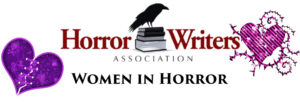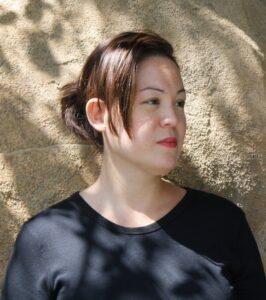

K.P. KULSKI is a Hawaii-born Korean-American author, historian, and career vampire of patriarchal tears. Channeling a lifelong obsession with history and the morose she’s birthed the gothic horror novel, Fairest Flesh, and novella, House of Pungsu. She bartered nine years of her life to the U.S. Navy and Air Force for food and later taught college history for the captive audience. Trapped by a force field, she currently lives in the woods of Northeast Ohio where she (probably) brews potions and talks to ghosts. Follow her on Twitter @garnetonwinter or garnetonwinter.com.
What inspired you to start writing?
Growing up wasn’t a nice time for me, and I found solace in stories. I loved to read, imagine stories of my own about fantastic places, and found exquisite beauty in poetry. It was my safe place. I used to call my book collection “my old friends.”
I wrote poetry to cope with things and later I wrote some short stories, but mostly snippets of whatever scene I had in my head. It was escape, expression, and coping. I’m not sure I’d be here without all these things in my life.
What was it about the horror genre that drew you to it?
I always say horror chose me. When I started the MFA program at Seton Hill University, I intended to write fantasy because I’m a fan of the fantasy genre. But each time I sat down to write, my pen would bleed with darkness. The horror just came out of me and I think sometimes it’s because it’d been waiting to be released. There’s a lot of blood I need to put on the page and I’m not sure I’ll ever stop writing horror. It certainly seems to have been destiny.
Do you make a conscious effort to include female characters and themes in your writing and if so, what do you want to portray?
I’m not sure how conscious it is, but there’s a lot of me in my work, so it feels natural that female characters make up most of my characters. Much of my work focuses on the female experience, and often the experience of Asian women. I feel that horror is uniquely suited to pulling out the messiness of living, the tangle of emotions and holding them up to the light.
What has writing horror taught you about the world and yourself?
That we all have horror inside us. Writing it has allowed me to push it out, remold it to serve a purpose, and let it live outside of me. It can be such a powerful and an honest genre.
How have you seen the horror genre change over the years? And how do you think it will continue to evolve?
Horror has increasingly become a place to grapple with big issues in the real world, such as racism, refugee experiences, transphobia, and sexism, to name just a few. It’s why we are seeing a wonderful renaissance in the horror storytelling.
Horror delights in turning things on its head and challenging readers, pushing them to see multiple perspectives, and I think we’ll see this continue.
How do you feel women have been represented thus far in the genre and what hopes do you have for representation in the genre going forward?
During my undergrad, I had an amazing women’s studies professor who used to say that if you want to know the true status of women and/or any historically marginalized group, don’t just look at the general population, look at the top. I see horror as an amazing place right now. There’s been more and more women being published, there’s been a fantastic growing mainstream awareness of LGBTQ+ and BIPOC voices. This brings me so much joy. It is a gorgeous thing to see, but we still have a way to go. I have a lot of hope and faith in this community and believe we will get there as long as we continue to lift each other up.
Who are some of your favorite female characters in horror?
I’ve mentioned her before, but she’ll always be among my favorites, Ming Wai from Shawna Yang Ryan’s Water Ghosts. She’s wonderfully unsettling and I swear I can feel the dampness come off of her in waves right off the page. The tortured Andi from Sara Tantlinger’s To Be Devoured. The mother from Catriona Ward’s The Last House on Needless Street. I can’t forget to mention classic favorites, Merricat from Jackson’s masterpiece We Have Always Lived in the Castle, and the heavy, humid, and ever-present-but-not-present du Maurier’s Rebecca.
Who are some women who write horror you recommend our audience check out?
I can’t possibly have enough room to mention them all because there are so many of us. Just to name a few: J.A.W. McCarthy, Lee Murray, Nuzo Onoh, Rena Mason, Yi Izzy Yu, Donyae Coles, Geneve Flynn, Sara Tantlinger, Gwendolyn Kiste, Jaye Wells, Nadia Bulkin, Jennifer McMahon, Gabriela Lee, Patricia Lillie, Angela Yuriko Smith, Catriona Ward, Aliya Whiteley. I feel like I could go on forever. Truly, it a fabulous time to read horror.
What is one piece of advice you would give horror authors today?
Write your truth. Write what makes you feel.
If you’re like most writers, you’ll struggle with imposter syndrome and if so, the truth is, you may never fairly see your own value as a writer. In a strange way, I personally find this idea liberating, because if I’ll never really know, then it doesn’t matter. I just try to continue learning while staying true to what brought me to write.
Keep learning about yourself. The journey of self-discovery is part of the experience of writing. The stories that really stick with us, no matter what genre, are about the human condition.
And to the women who write horror out there who are just getting started, what advice would you give them?
We are all in this together. Celebrate, support, and cheer for your fellow authors, but especially for your sisters. Horror is a place we come together and write some cool shit. Choose to lift each other up.

